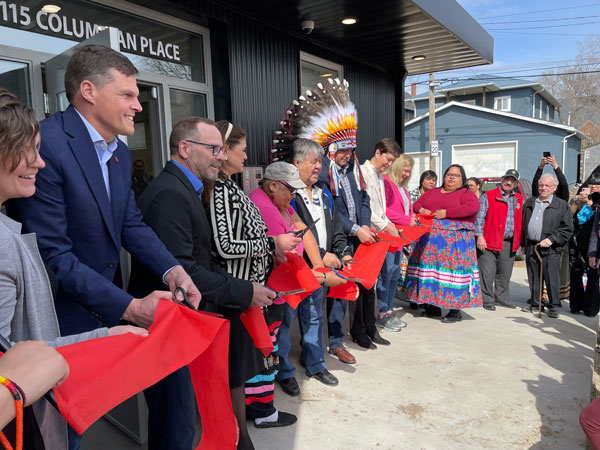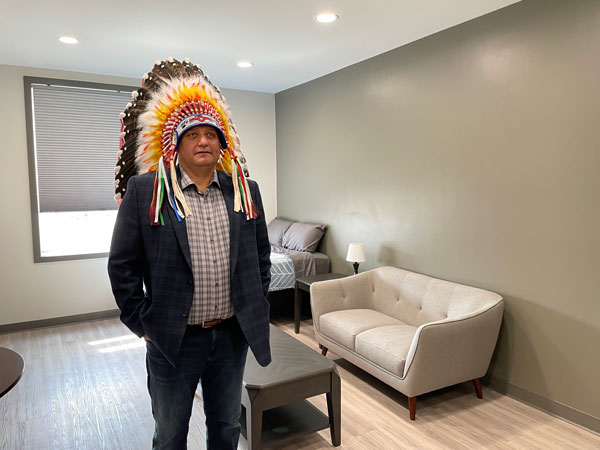
Women transitioning back to society after being released from Pine Grove Correctional Centre in Prince Albert will have a new option after the grand opening of the ikweskicik iskwewak facility by the Saskatoon Tribal Council (STC) on Friday.
Tribal Chief Mark Arcand was joined by partners including those from CMHC, as well as provincial partners and the City of Saskatoon.
The housing facility will help women who were recently released from Pine Grove Correctional Centre transition back into society with proper supports.
“I think it’s a good investment from the federal, provincial, (and) municipal governments in regards to investing in rehabilitation for women that are exciting Pine Grove facility,” Arcand told media after the ribbon cutting.
Arcand said the new facility will have a positive effect for women being released from Pine Grove. It will give them a place to finish off their sentence. They can also stay for in the facility for a maximum of 18 months after finishing probation.

Arcand also said the facility would help recently released women to find services helping them with mental health, and addictions, while helping them finding opportunities for education, job hunting, and in some cases, getting their children back.
“Whether they stay the full 18 months or just partial, it will now have a good positive effect on rehabilitation,” he said.
“For us, that’s very important that we really, really invest in women,” he added. “We know the high numbers of Missing and Murdered Indigenous Women and Girls in our country and right now I think the Saskatoon Tribal Council with all of their partners are moving in the right direction. To be honest this is a good step and a positive step.”
Arcand said STF staff are already in Pine Grove working with inmates on case plans. That will allow them to have a plan in place by the time they’re released.
He said the entire development is a positive.
“For us to come into a brand new facility like this that’s freshly made, freshly painted–it’s not a rehabilitation building. It’s brand new—shows that there is an investment here for rehabilitation from all levels of government,” he said.
Arcand explained that they would have six people coming to the facility on Monday with 18 expected by May 1.
“We hope that’s the positive outcome,” he said. “We just want to be part of a program and of a community that’s really providing a healthy and safe place for women. But, we need more because there are 100 women on the waiting list.”
Arcand said that eligibility is based on facility evaluations, which are based on work by the Tribal Council.
He added that the STC is well-suited to open and operate such a facility because, as an Indigenous organization, they understand the challenges.
“The women are very, very trusting of our organization because we are understanding,” he said. “We know what the challenges are. We have been through the program with them. We have seen what they have been through, so they know and they trust (us in) really enhancing the need of the women that are incarcerated.”
The new facility will also expand on what the Tribal Council is doing with their Emergency Wellness Centre in Saskatoon. Arcand said there are too many women missing right now, and the Wellness Centre is designed to prevent that number from increasing.
“They don’t have a place to go,” he said. “We see this at our Emergency Wellness Centre. Women are coming there (because) they are being abused. It’s not right that’s happening to women, period. Unfortunately, it is a high number of Indigenous women.”
Arcand said the investments are about helping people to have a high quality of life.
“I think it’s a good step in the right direction, but at the same time, the women are being abused on the street, they have nowhere to go, and I think that’s the focal point,” he said.
While the 18 new spaces are welcome, Arcand said it’s not enough. The waiting list for such a space has 100 people on it.
However, he said it is a small victory, and having it around will allow family members to visit and re-establish relationships.
“That’s a priority,” Arcand said. “In our First Nations communities (and) Indigenous communities, kinship is a priority. It’s family first and right now when you see family in a tough situation like that being incarcerated away from your children, it’s hard to deal with.”
michael.oleksyn@paherald.sk.ca

